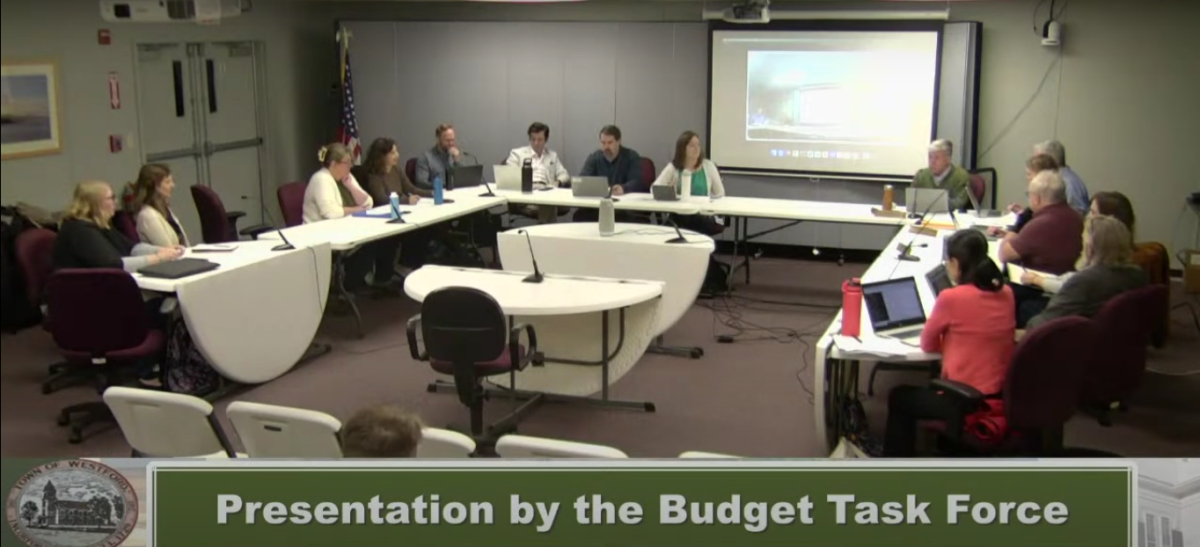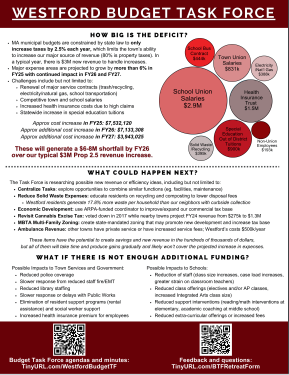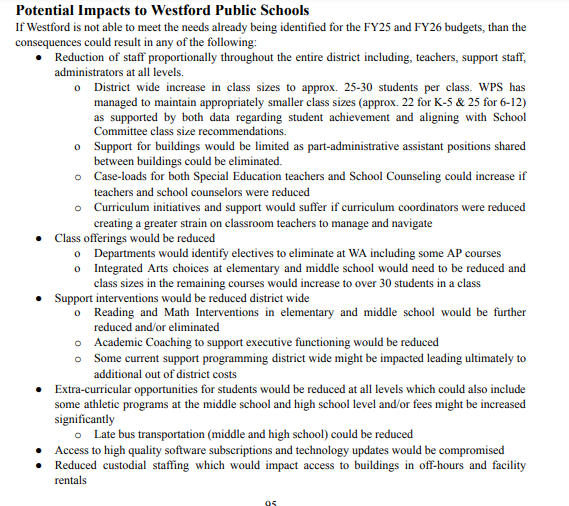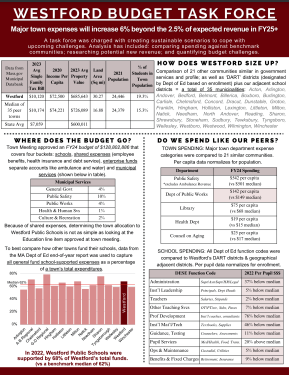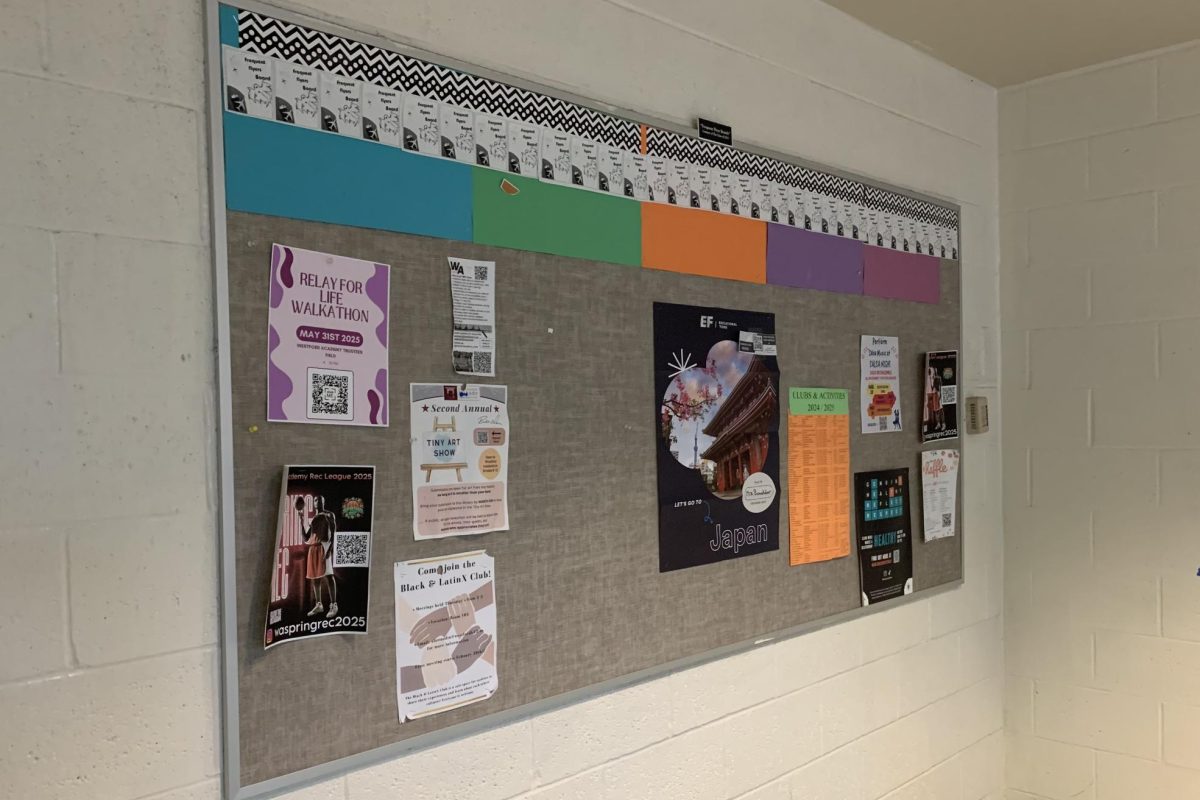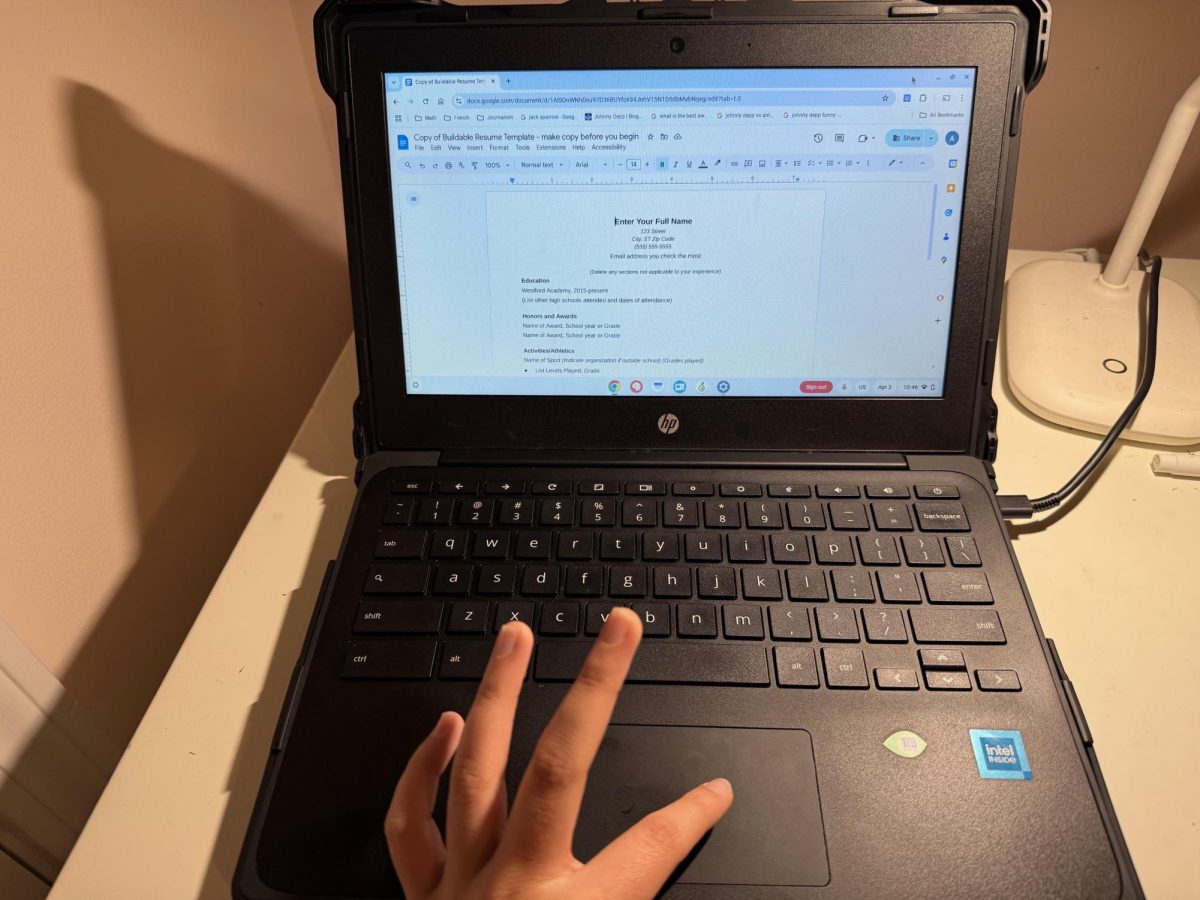Westford will be facing a total $6-8 million deficit by fiscal year 2026 (FY26) due to major town expenses increasing beyond the expected revenue in upcoming years. In order to meet these budget needs, the town will need to explore additional sources of revenue or undergo significant cuts in school and town services, according to the Final Budget Task Force Report released on October 18th.
To address this unprecedented budget shortfall, the Budget Task Force was formed in May of 2023 and was charged with conducting further research to determine possible options for Westford. The group consists of nine members from various town committees including the select board, school committee and finance committees, along with residents and town manager Kristen Las.
Why exactly are expenses increasing?
According to the report, the deficit is not the result of any single cause, but rather a culmination of multiple factors. Because of rising inflation along with many contracts in need of renewal, there are several key areas where the town is expected to face sharp cost increases of 10-30%. These include waste collection, union contracts, health insurance, and energy costs.
“Whereas, in past years, maybe we’ve had a million dollars here or there to try to figure out, this is $6 to $8 million,” School Committee Chair and Budget Task Force Vice Chair Valery Young said. “So, we’re just not able to fix this within sort of our normal budgeting processes.”
One contributor to these cost increases includes Westford’s contract with longtime waste hauler ACME Waste, which will expire in June of 2024. Because the contract was made in 1989, Westford had been able to secure a low-cost bid. However, renewing the contract with another company in 2024 is projected to cause a $500,000 increase, compared to the typical yearly increase which is $75,000.
In addition, new teacher union contracts have been settled, adding a $3.3 million cost in FY25. Bus contracts have also experienced an 11% increase in prices, and special education private school tuitions will increase by 14% in FY24, among other causes.
In part, budget challenges are often a result of Proposition 2 ½, a Massachusetts statute passed in 1980, which states that property taxes cannot be raised by more than 2.5% every year. With this 2.5% increase, the town gains about $3 million in revenue each year, allowing them to make up for cost increases. However, due to factors such as inflation, this does not keep up with actual increased town costs from year to year.
“Right now we’re exiting this low inflation period, so suddenly everything is jumping up in costs,” Budget Task Force chair Tom Clay said. “And when you put all these things together, it ends up being a really significant amount of money.”
What does this mean for Westford?
Although budgeting issues are not rare, the issues expected for FY26 are especially significant because of the magnitude of the deficit. Making up for these cost increases will challenge residents and town officials to weigh the balance between maintaining town services and implementing higher tax rates.
“It only happens every so often that a town has to decide, do you like the services that you have and want to keep paying for them?” Young said. “Or the flip side is that we would have to change the services we’re offering to fit the budget we have.”
If new sources of revenue are not implemented, consequences may include a reduction of positions and services across towns and schools.
For Westford Public Schools alone, the projected impacts include an estimated 35-40 fewer school staff members in school staff, reduced electives or AP class offerings, and a strain on support interventions district-wide. At a town level, the cuts may result in 25-30 fewer first responders and town workers, increased health insurance costs, reduced patrol, and a decrease in senior services, among various possibilities.
According to Clay, in order to avoid making significant cuts to town services, residents will likely have to consider new revenue opportunities along with potential tax increases.
“We want people be thinking about this with us and participating because it is a big set of decisions; we don’t want to raise tax levels, but we also don’t want to cut service levels,” Clay said. “So, setting that balance [..] and deciding that together is going to be really important.”
What are possible solutions?
In their report, the Task Force compiled several recommendations to increase revenue or cut down on costs. Some of these included committing to sustainable energy practices, exploring innovative revenue sources, and making smarter investments. However, most of the recommendations offered, although helpful, will not have an instantaneous impact on the deficit.
One viable option to counteract these large budget challenges would include residents voting in favor of a Proposition 2 ½ override. This would create a permanent tax increase over 2.5% for residents, but allow the town to raise revenue through property tax within a short period of time.
A $1 million revenue increase through an override is projected to add about $107 to the average homeowner property tax bill. An override would require a majority vote of the Town Meeting in March and a majority ballot vote at the following Town Election.
“The Task Force is not really out to advocate for an override,” Young said. “But, the other option, if you don’t do an override, or if an override fails, is that you’d have to cut your budget by a lot: $16 million across all the town services.”
As the Budget Task Force compiles data and research to help make the Select Board make a final decision, they emphasized that it is important for residents to be active participants in the process.
“I think the urgency in front of us now is to get everybody to get into this dialogue, so we can make the best decision that works for everyone,” Clay said. “We’re going to need a lot of engagement here because it’s really a big set of issues that really affect everyone.”

